KYC verification of individuals (AUS)
Use this API call to perform KYC verification of individuals.
Parameters
| Name | Type | Description |
|---|---|---|
country (required) | string | AUS |
firstName (required) | string - letters, apostrophes, spaces, hyphens | Less than 80 characters |
middleName (required, if present) | string - letters, apostrophes, spaces, hyphens | Less than 80 characters |
lastName (required) | string - letters, apostrophes, spaces, hyphens | Less than 80 characters |
dateOfBirth (required) | string | DD/MM/YYYY |
unitNumber (required, if present) | string or null* | |
streetNumber (required) | string | |
streetName (required) | string | |
streetType (required, if present) | string or null* | Street types |
suburb (required) | string | Australian suburb name |
postcode (required) | string | 4 digits |
state (required) | string | ACT / NSW / NT / QLD / SA / TAS / VIC / WA |
gender | string | male/female/other/preferNotToSay |
email | string |
Tags
You can add tags to your verification requests to help you organise your verifications by using the metadata_tags parameter. Read more about tags here.
ID documents
Submitting ID documents is optional. You can use ID documents as a verification source to improve the likelihood of a successful verification.
Driver licence
| Name | Type | Description |
|---|---|---|
driversLicenceNumber (required, if submitting) | string | See validation rules per state below |
driversLicenceCardNumber (required, if submitting) | string | See validation rules per state below |
driversLicenceState (required, if submitting) | string | ACT / NSW / NT / QLD / SA / TAS / VIC / WA |
driversLicenceImageFront | string | base64 Data URI (JPG/PNG/PDF) |
driversLicenceImageBack | string | base64 Data URI (JPG/PNG/PDF) |
ACT driver licence
| Field | Requirement | Length/Format | Restrictions | Thumbnail |
|---|---|---|---|---|
| Driver Licence Number | Yes | Between 1 and 10 numbers | No spaces or special characters | 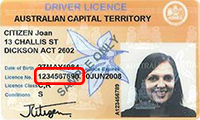 |
| Driver Licence Card Number | Yes | Equal to 10 alphanumeric characters | 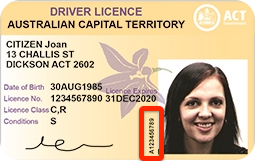 | |
| Given Name | Yes | Between 1 and 20 characters | ||
| Middle Name | No | Between 1 and 20 characters | ||
| Surname | Yes | Between 1 and 40 characters | ||
| Date of Birth | Yes | DD/MM/YYYY |
NSW driver licence
| Field | Requirement | Length/Format | Restrictions | Thumbnail |
|---|---|---|---|---|
| Driver Licence Number | Yes | Between 6 and 8 alphanumeric characters | No spaces or special characters | 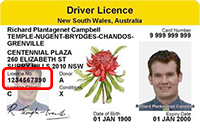 |
| Driver Licence Card Number | Yes | Equal to 10 numeric characters | 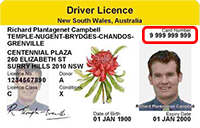 | |
| Given Name | Yes | Between 1 and 20 characters | ||
| Middle Name | No | Between 1 and 20 characters | ||
| Surname | Yes | Between 1 and 40 characters | ||
| Date of Birth | Yes | DD/MM/YYYY |
NT driver licence
| Field | Requirement | Length/Format | Restrictions | Thumbnail |
|---|---|---|---|---|
| Driver Licence Number | Yes | Between 1 and 10 numbers | No spaces or special characters | Issued after Nov 2020 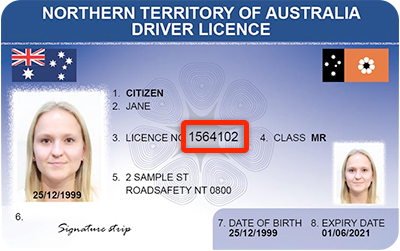 Issued before Nov 2020 Issued before Nov 2020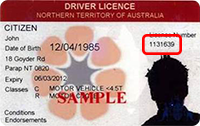 |
| Driver Licence Card Number | Yes | Between 6 and 8 numeric characters | Issued after Nov 2020 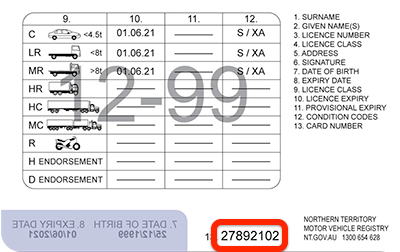 Issued before Nov 2020 Issued before Nov 2020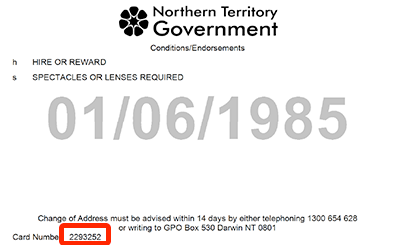 | |
| Given Name | Yes | Between 1 and 20 characters | ||
| Middle Name | No | Between 1 and 20 characters | ||
| Surname | Yes | Between 1 and 40 characters | ||
| Date of Birth | Yes | DD/MM/YYYY |
QLD driver licence
| Field | Requirement | Length/Format | Restrictions | Thumbnail |
|---|---|---|---|---|
| Driver Licence Number | Yes | Between 8 and 9 numbers | No spaces or special characters | 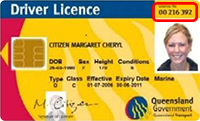 |
| Driver Licence Card Number | Yes | Equal to 10 alphanumeric characters | Front 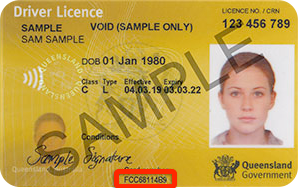 Back Back 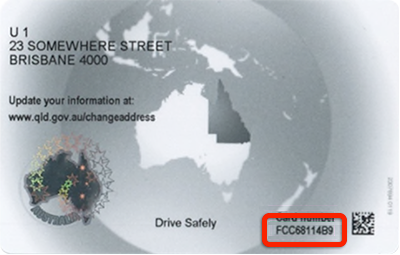 | |
| Given Name | Yes | Between 1 and 20 characters | ||
| Middle Name | No | Between 1 and 20 characters | ||
| Surname | Yes | Between 1 and 40 characters | ||
| Date of Birth | Yes | DD/MM/YYYY |
SA driver licence
| Field | Requirement | Length/Format | Restrictions | Thumbnail |
|---|---|---|---|---|
| Driver Licence Number | Yes | Equal to 6 alphanumeric characters | No spaces or special characters | 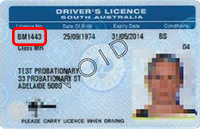 |
| Driver Licence Card Number | Yes | Equal to 9 alphanumeric characters | 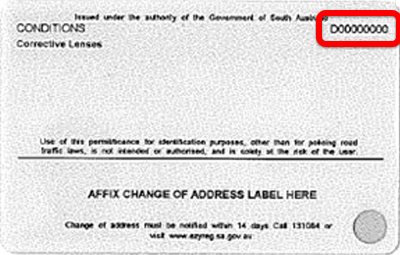 | |
| Given Name | Yes | Between 1 and 20 characters | ||
| Middle Name | No | Between 1 and 20 characters | ||
| Surname | Yes | Between 1 and 40 characters | ||
| Date of Birth | Yes | DD/MM/YYYY |
TAS driver licence
| Field | Requirement | Length/Format | Restrictions | Thumbnail |
|---|---|---|---|---|
| Driver Licence Number | Yes | Between 6 and 8 alphanumeric characters | No spaces or special characters | 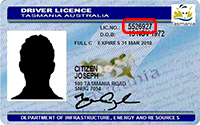 |
| Driver Licence Card Number | Yes | Equal to 9 alphanumeric characters | 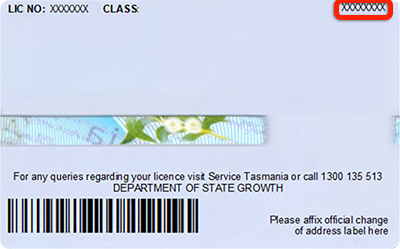 | |
| Given Name | Yes | Between 1 and 20 characters | ||
| Middle Name | No | Between 1 and 20 characters | ||
| Surname | Yes | Between 1 and 40 characters | ||
| Date of Birth | Yes | DD/MM/YYYY |
VIC driver licence
| Field | Requirement | Length/Format | Restrictions | Thumbnail |
|---|---|---|---|---|
| Driver Licence Number | Yes | Between 1 and 10 numbers | No spaces or special characters | 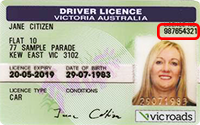 |
| Driver Licence Card Number | Yes | Equal to 8 alphanumeric characters | 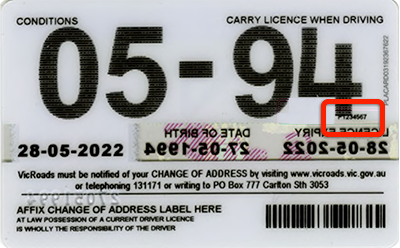 | |
| Given Name | Yes | Between 1 and 20 characters | ||
| Middle Name | No | Between 1 and 20 characters | ||
| Surname | Yes | Between 1 and 40 characters | ||
| Date of Birth | Yes | DD/MM/YYYY |
WA driver licence
| Field | Requirement | Length/Format | Restrictions | Thumbnail |
|---|---|---|---|---|
| Driver Licence Number | Yes | Equal to 7 numbers | No spaces or special characters | 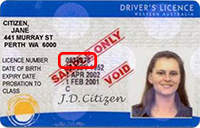 |
| Driver Licence Card Number | Yes | Between 8 and 10 alphanumeric characters | 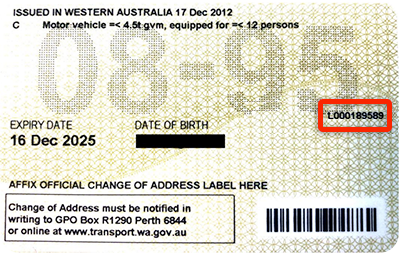 | |
| Given Name | Yes | Between 1 and 20 characters | ||
| Middle Name | No | Between 1 and 20 characters | ||
| Surname | Yes | Between 1 and 40 characters | ||
| Date of Birth | Yes | DD/MM/YYYY |
Passport
| Name | Type | Description | Thumbnail |
|---|---|---|---|
passportNumber (required, if submitting) | string | See notes and validation rules below | 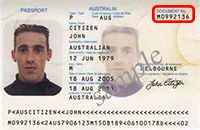 |
passportCountryOfIssue (required, if submitting) | string | 3 letter country ISO | |
passportImage | string | base64 Data URI (JPG/PNG/PDF) |
Passport number validation rules
| Country | Validation rules |
|---|---|
| AUS | 1 or 2 letters followed by 7 digits |
| NZL | 1 or 2 letters followed by 6 digits |
| All other countries | 1-14 characters |
Medicare
| Name | Type | Description | Thumbnail |
|---|---|---|---|
medicareCardColour (required, if submitting) | string | green / blue / yellow | |
medicareCardNumber (required, if submitting) | string | Valid Australian Medicare number, 10 digits long. See validation rules below. |  |
medicareIndividualReferenceNumber (required, if submitting) | string | 1 digit |  |
medicareNameOnCard (required, if submitting) | string | As it appears on the card. Only alphanumeric characters, dashes, spaces or apostrophes. | |
medicareExpiryDate (required, if submitting) | string | As it appears on the card (can be MM/YYYY (green), or DD/MM/YY (blue and yellow) depending card colour) |  |
medicareImage | string | base64 Data URI (JPG/PNG/PDF) |
Medicare number validation rules
The Medicare card number comprises:
- Eight digits;
- A check digit (one digit); and
- An issue number (one digit).
Note: the first digit of the Medicare card number should be in the range 2 to 6.
Medicare card number check digit calculation
Step 1. Calculate the sum of: ((digit 1) + (digit 2 _ 3) + (digit 3 _ 7) + (digit 4 _ 9) + (digit 5) + (digit 6 _ 3) + (digit 7 _ 7) + (digit 8 _ 9)) where digit 1 is the highest place value digit of the Medicare card number and digit 8 is the lowest place value digit of the Medicare card number.
Example: for Medicare card number '2123 45670 1', digit 1 is 2 and digit 8 is 7.
Step 2. Divide the calculated sum by 10.
Step 3. The check digit is the remainder.
Example: For Medicare card number 2123 4567.
(2) + (1 _ 3) + (2 _ 7) + (3 _ 9) + (4) + (5 _ 3) + (6 _ 7) + (7 _ 9) = 170
Divide 170 by 10. The remainder is 0.
The check digit for this Medicare number is 0.
Note on uploading documents: base64 encoded uploads must be submitted as a Data URI (with data format prefix). Example PDF format:
data:application/pdf;base64,JVBERi0xLjUKJYCBgoMKMSAwIG9i...
Runnable example
// api endpoint
const apiEndpoint = 'https://dev.bronid.com/verify';
// request body
const data = {
"metadata_version": "4",
"metadata_serviceUid": "XL7ULiU6B4QE9Y2iWFZnhtMDKFN2",
"metadata_secretKey": "api_sec_NJAtNcRtUrPlf7xYDrMNP9URI-ZfN314",
"metadata_userId": "yourUniqueUserId",
"metadata_tags": ["product1", "client1"],
"type": "individual",
"fields": {
"country": "AUS",
"firstName": "Janek",
"middleName": "ok",
"lastName": "Citizen",
"dateOfBirth": "20/10/1980",
"unitNumber": "1",
"streetNumber": "95",
"streetName": "Lennox",
"streetType": "Street",
"suburb": "CASINO",
"postcode": "2470",
"state": "NSW",
"email": "email@gmail.com"
}
};
try {
const response = await fetch(apiEndpoint, {
method: 'POST',
headers: {
'Content-Type': 'application/json',
},
body: JSON.stringify(data),
});
if (!response.ok) {
const errorData = await response.json();
console.log('error! click the results to expand them');
console.log(JSON.stringify(errorData, null, 2));
} else {
const result = await response.json();
const printResult = 'bronId API response: ' + JSON.stringify(result, null, 2);
console.log(printResult);
}
} catch (error) {
console.log('Fetch error: ', error);
}